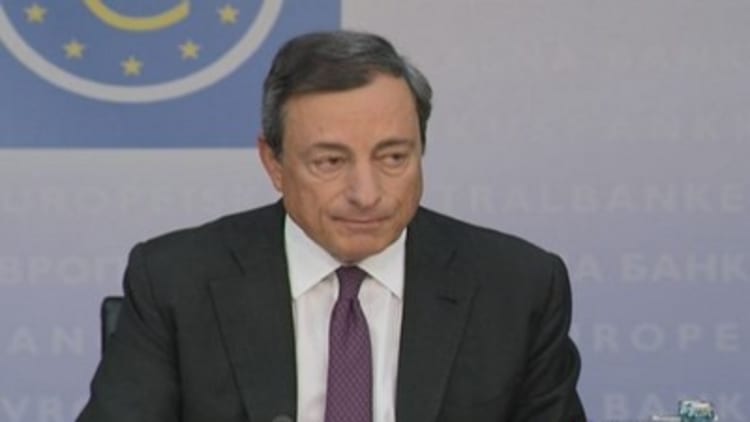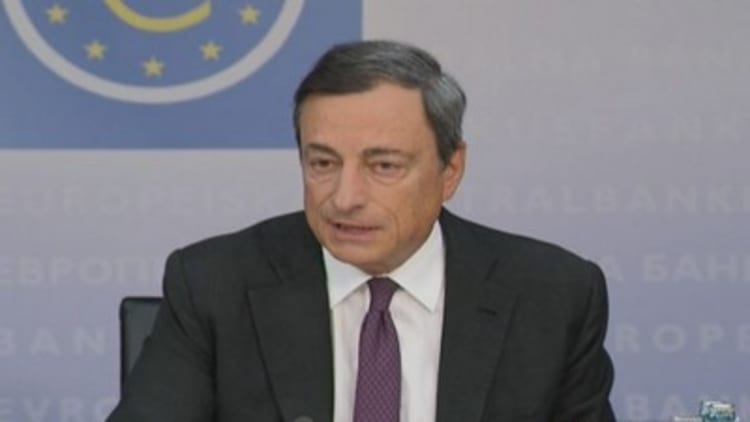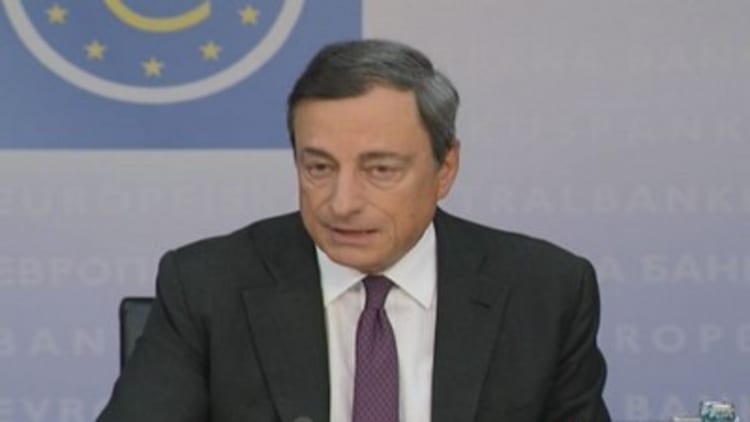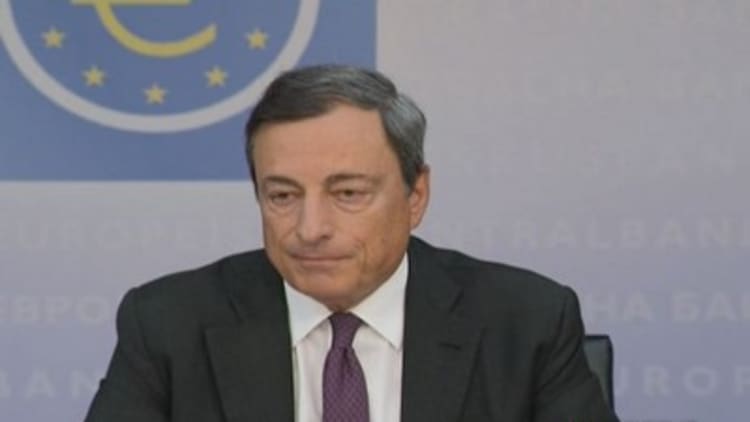




The European Central Bank (ECB) surprised investors and markets on Thursday by cutting interest rates to record lows and announcing a bond-buying program.
From September 10, the rate on the main refinancing operations will be decreased by 10 basis points to a new low of 0.05 percent. The rate on the marginal lending facility will be decreased by 10 basis points to 0.30 percent and the rate on the deposit facility will be cut still further into negative territory, to -0.20 percent.
The euro fell by over 1 percent against the dollar to under $1.30 after the rate announcement, before paring some losses. European stocks traded sharply higher.
In his regular press conference at 1:30 p.m., Draghi announced the ECB would purchase asset-backed securities (ABS) and covered bonds to boost the economy and boost inflation.
"This is quite complex package of measures," Draghi told assembled journalists.
"The purpose is very different from previous programs... the aim is to increase the measures that produce credit-easing… and also to significantly stir the size of our balance sheet towards the dimensions it used to have at the beginning of 2012."
Some economists had predicted ABS purchases, given the ECB's announcement in August that it had hired Blackrock to advise on a possible ABS-buying program.
Under such a program, euro zone banks would sell the ECB their loans and other types of credit that have been packaged together. Draghi said the ECB would only purchase less risky senior tranches of securitized debts and loans, as well as mezzanine tranches with guarantees.
Purchases will include both newly created and existing ABS, as well as residential mortgage-backed securities (RMBS).
Another policy option open to the ECB would have been "full-blown" QE, like the U.S. Federal Reserve, where the central bank buys sovereign debt from lenders. This would have been a controversial move —not least because there are no common euro zone bonds.
However, some analysts do expect the next step to be a QE program. Nick Beecroft. chairman and senior market analyst at Saxo Capital Markets UK thinks there would be a launch by the end of the year "but feel the ECB, and specifically the (German) Bundesbank, will have to be dragged kicking and screaming to this".
Nonetheless, Beecroft believes, the program could be facilitated by a combination of three conditions: stubbornly high euro, even lower growth, and even lower actual observed inflation or a decline in key measures of inflation expectations.
Draghi said that the ECB had discussed "full-blown" purchases of its sovereign debt at its latest meeting, and that some members had been in favor.
"Some of our governing council members were in favor of doing more than just presented and some were in favor of doing less. So our proposal strikes the middle road," he told journalists.
A "comfortable majority" were in favor of the "middle road" with which the ECB has decided to proceed, Draghi said.
Concerns about growth-sapping low inflation have already seen the ECB unveil a host of measures designed to give the euro zone's recovery a boost in June.
Read MoreEurozone growth stagnates, Germany contracts
Since then, economic data for the region have continued to disappoint. Euro zone inflation fell to a worrying 0.3 percent in August, heightening fears that the region could be heading towards a period of deflation.The ECB now forecasts inflation will come in at 0.6 percent this year and will not start accelerating until 2015.
Meanwhile, euro zone economy grew by just 0.2 percent in the second quarter of 2014, and the closely-watched composite Purchasing Managers' Index— which measures business activity in the euro zone—slipped in August, coming in below forecasts.
On Thursday, Draghi said the ECB had downgraded its euro zone growth forecasts for 2014 and 2015, to 0.9 percent and 1.6 percent respectively.
Draghi added that growth in the second quarter had been weaker than expected and that incoming third-quarter data suggested slowing economic recovery.
He also said the ECB did not intend to cut interest rates any further.
Marc Chandler, head of currency strategy at BBH, forecast non-euro zone European countries would follow the ECB's lead in decreasing rates.
"Denmark is the most likely candidate to follow the ECB in cutting rates. Poland has also signaled it will cut rates shortly," he said in a research note published while Draghi was speaking.
Chandler said it was a "tougher call" to predict what action the Swiss National Bank (SNB) would take after its meeting on September 18.
"The euro had edged closer to the SNB's floor. There has been no sign of intervention, but this would seem to be the first line of defense."


